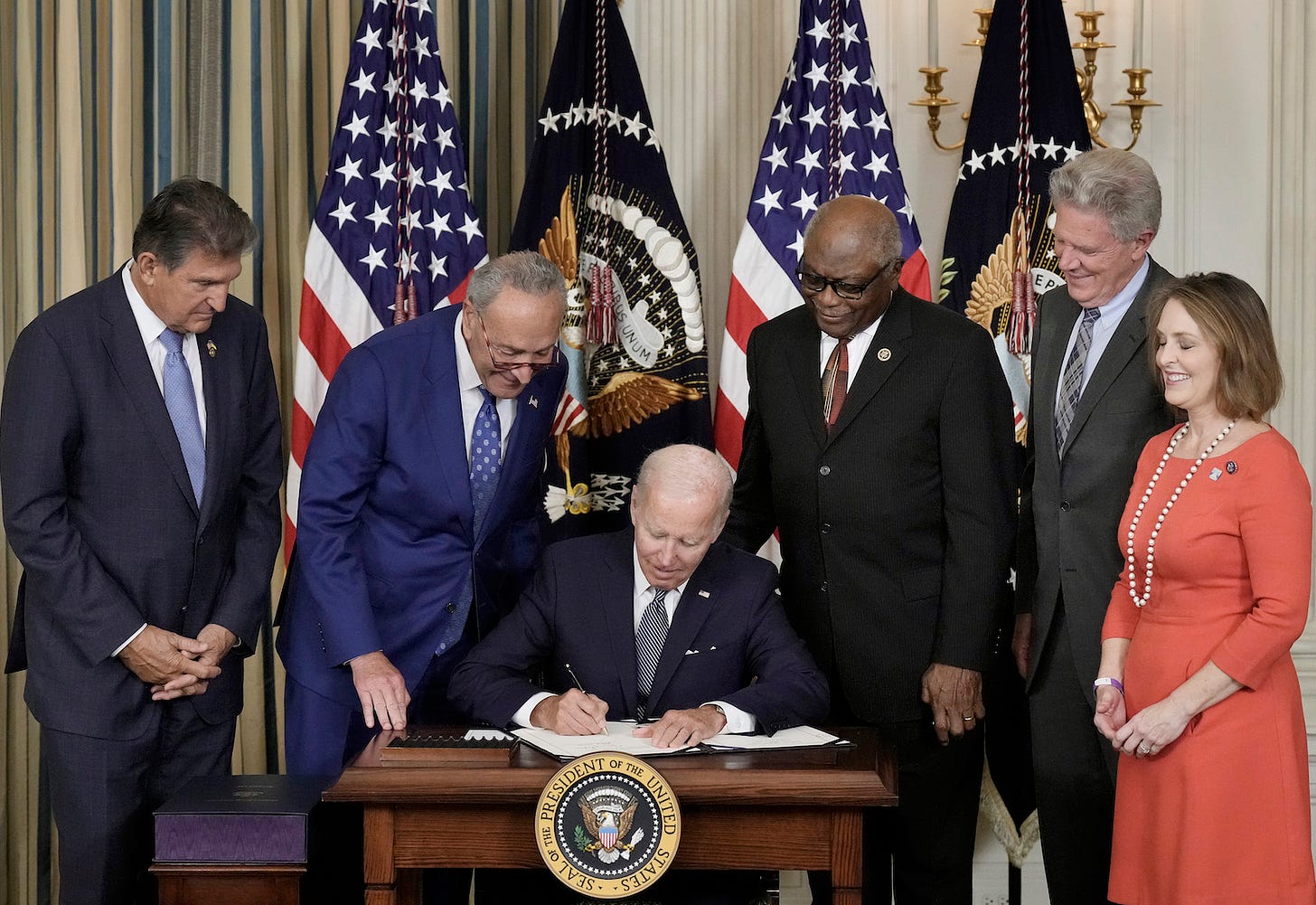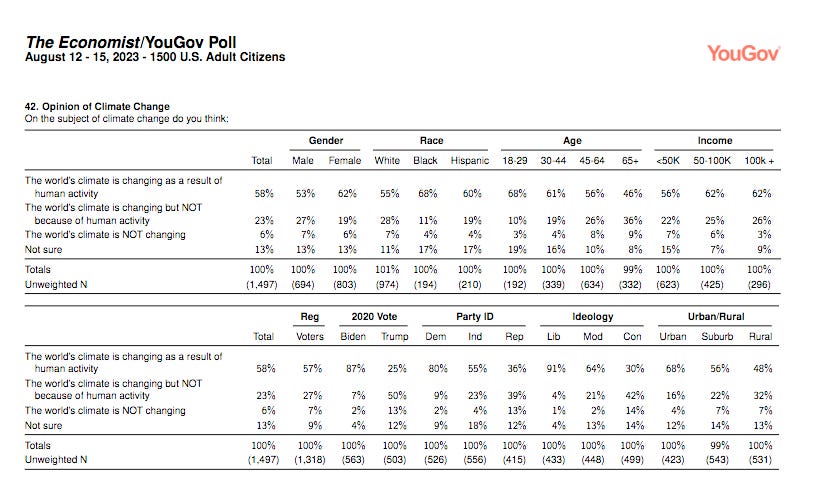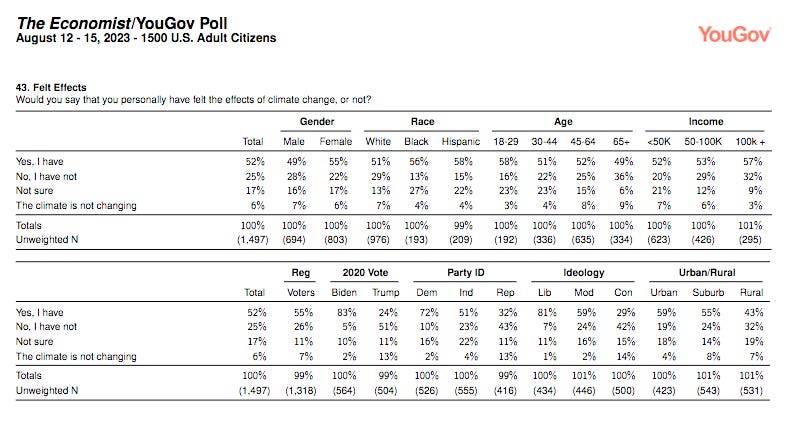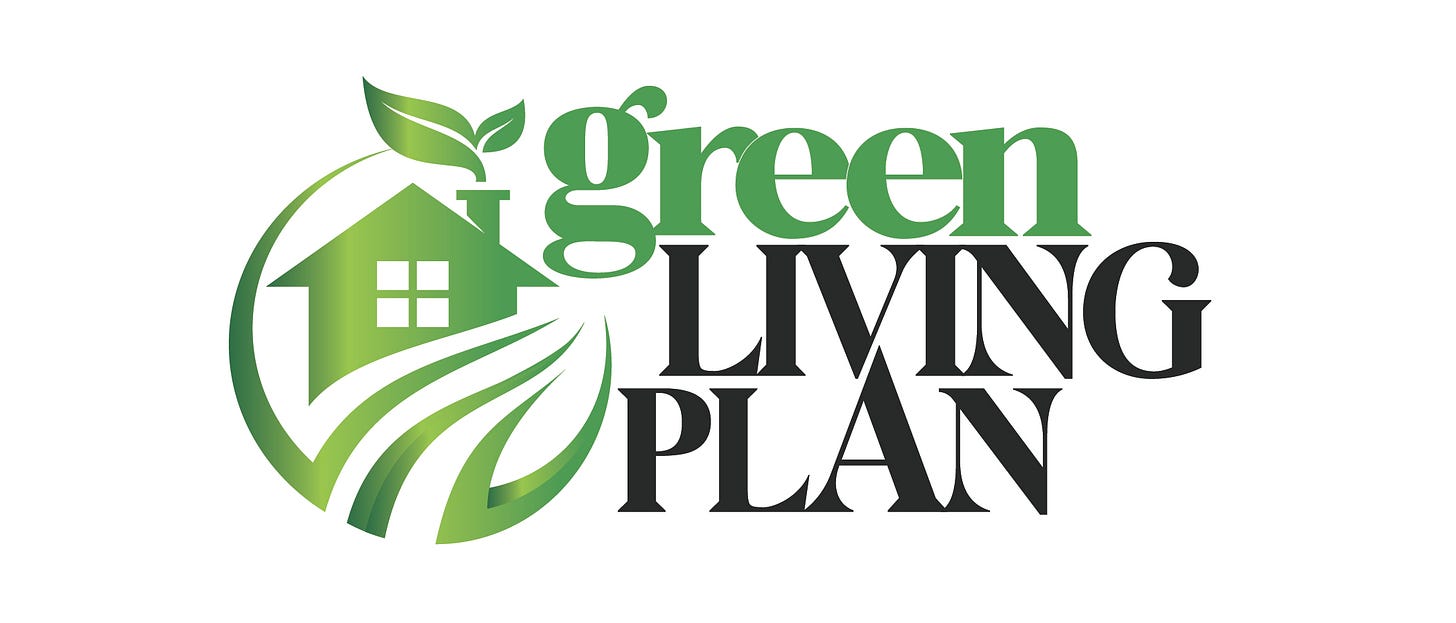Most Americans Really Don't Know What the Inflation Reduction Act Is. Vulnerable Folks Even Less.
Green Living Plan: During the first anniversary week of Biden's Climate Plan becoming law, most aren't clear on what it is or what it's supposed to do. The most climate-impacted groups even less.
Publisher’s Note
Earlier this week, we hit the first anniversary of President Biden’s signing of his signature $500 billion “Inflation Reduction Act” or what others have more simply referenced as the Biden Climate Plan. The latter is exactly what it’s operating is - or trying to. But, since the president along with aligned Democrats needed to side with political expediency and clever messaging to get it passed (given that Republican resistance and continued public rejection of proven climate impacts was thwarting the outright identification of a “Biden Climate Plan”), everyone settled on the Inflation Reduction Act.
One year later, most Americans don’t know what that is, even as he’s celebrating it as part of his larger Bidenomics approach. That’s even more problematic as climate crisis pressures intensify and the need for stronger public policy response grows with each passing disaster (which could have been avoidable at some point over, at least, the past 50 or so years).
A recent Washington Post-University of Maryland poll released this week discovered less than 30 percent of Americans even know what the “IRA” is, nor are they familiar with an array of obscure tax credits which were designed to offset Republican obsession with simultaneous deficit-reduction and tax-reduction …
That law is the first big and rather hurried investment we’ve seen from not just this administration, but any administration on tackling climate crisis: $500 billion is an impressive number. Yet, it’s not helping that 1) most don’t know what the law is or what it does while 2) fossil fuel-instigated climate disasters ranging from blistering summer heat, storms and wildfires this summer (and don’t forget about hurricane season about to happen) are happening at the same time. That’s led to a greater share of the public grumbling that the Biden administration has not been as effective on responding to climate crisis, at least according to this poll …
The compare-contrast numbers between Biden and Trump are, at first glance, insane since the latter won’t even acknowledge climate crisis exists - along with his diehard fan base feeling the exact same way. That the Republican Party is even getting nearly a quarter of the American public’s credit on climate crisis response is also insane considering how much they’ve contributed to the systematic decay of decades long conversation around the topic in favor of fossil fuel and extraction interests. Yet, lack of general literacy (and some clumsy messaging) around large pieces of legislation such as the Inflation Reduction Act, despite its good intentions. It also doesn’t help that Biden constrains himself from talking in an urgent or emergency-like fashion about the climate crisis, clearly out of political fears. But, judging from polls, he’ll need to find a way to overcome that.
A Deeper Look
We can’t pull demographic information from the Post/University of Maryland poll. Either they’re not sharing that or they wrongheadedly omitted it. But we’re able to dive much deeper into climate sentiments and extrapolate deeper demographic information among race, income, age and party lines by examination of the recent Economist/YouGov poll. It’s rather fascinating to see how, generally, whites disapprove more greatly of Biden’s handling of the environment compared to Blacks who, for the most part, approve while Hispanics are in-between. The older you are, however, means the less you’re inclined to believe Biden is managing this well. A lower income status will say the same, too. A believable, but still astounding 73 percent of Republicans disapprove of the way he’s handling “climate change and he environment” … but, wait a second: We thought Republicans actually didn’t believe in things like climate change and the environment. So how did they suddenly become experts?
But here’s where numbers get more problematic and create more trouble in finding robust policy solutions to climate crisis. We still have too many folks not believing that climate crisis is caused by human activity, including a worrisome percentage who believe that’s not the case (23 percent) or who are unsure (13 percent). A majority of whites do believe it’s caused by human activity, but just 55 percent compared to an overwhelming number of Black respondents, 68 percent, and Hispanics second to that, 60 percent. It also seems that a greater share of Gen-Zers than other age demographics, especially Millennials and Gen-Xers. That may be due to the fact that they’re less likely to have experienced longer, more normal winters compared to previous generations or that they didn’t experience the rather dramatic seasonal transitions that have become dangerously normal as they’ve grown up.
What does these numbers mean for 2024? How big will climate crisis and response to it be as issues in the presidential election? Will media harass candidates about it as an issue and force them to prioritize it? If so, it will be interesting to watch Republicans pivot as if they’d been talking about it or concerned about it all along.
A Marginalized Look
Clearly, based on the extent of climate impacts and major events we’ve seen, historically underserved and marginalized populations do get hit much worse and recover less. That’s slightly shown below in the basic numbers with fewer whites feeling climate impacts and clear majorities of Hispanic respondents (58 percent) and Black respondents (56 percent) saying they have felt an impact. What’s fascinating is how low-income respondents making under $50,000 are the least likely out of all income groups to say they’ve been hit by climate effects - which would go against a reasonable assumption that they, actually, would be the hardest hit due to lack of resources, lack of air conditioning during a heat wave or least likely to recover from a sudden disaster. But if you notice, they are, out of all income groups, the most unsure about whether they’ve felt a climate impact.
When asked, climate is less of a priority to Black and Brown and low-income respondents compared to other issues. Inflation/high prices, jobs and the economy, healthcare, education, civil rights, guns, and crime - not surprisingly - rank highest among Black and low-income respondents. Indeed, climate and the environment rank at the bottom of concerns when compared to other issues, barely registering as a top concern as other priorities take up space …
Which makes sense as pressures grow on a number of fronts from violent crime continuing to increase in major metropolitan areas to destruction of affirmative action to the constant crunch of high living prices and housing insecurity compounded by uncertainty over jobs. Still, it’s troubling that climate and environment rank near last as it should be as prioritized as everything else.
Clearly, greater public awareness, particularly around the investments from Biden climate plan dollars, could reverse that trend. We can’t locate the specific data Black communities are not as aware that a combination from climate-centered dollars from a $2 trillion mix of the Inflation Reduction Act, the CHIPS and Science Act and the Bipartisan Infrastructure Law should be funneled aggressively into their communities - yet, from what we can tell, they are not. These dollars could be the essential “Marshall Plan”-size investments needed to repair distressed and displaced communities that are facing, disproportionately, each of the problems listed above. As Brookings’ Hanna Love calls it, simply “invest[ing] in place.” All communities, but especially impacted communities, will also need to think more deeply about how climate is not only intersecting with every other issue of priority, but how it’s also fast shaping and will dramatically determine the trajectory of all of those issues. Inflation (price gouging) gets higher as climate impacts and disasters put pressures on the supply chain. The availability of jobs will be determined by where “green economy” investments are going as the whole economy is driven by climate priorities. Public health deteriorates, rising asthma rates, cancers and other chronic diseases, as the environment from climate dangers accelerates. Food insecurity rises as climate crisis rises and makes it harder to grow food. Crime, particularly violent crime, worsens as communities get hotter. Vulnerable communities must think harder about how much climate will play, is already playing, the central role in their quality of life. Demand the necessary investments to alleviate it.










